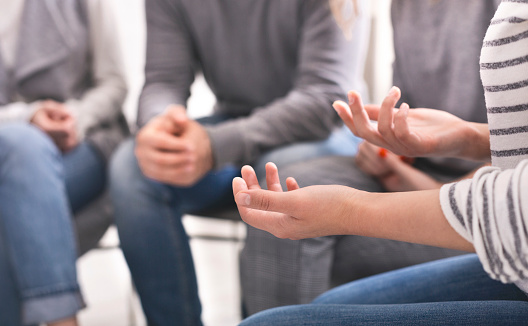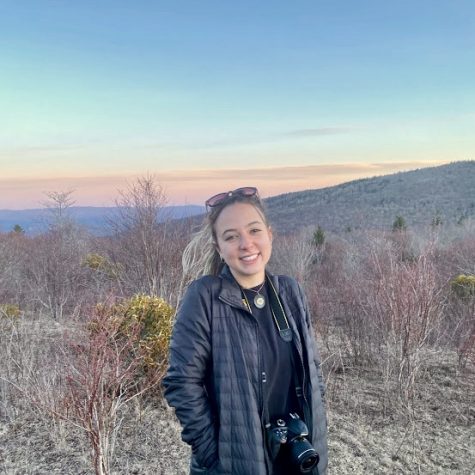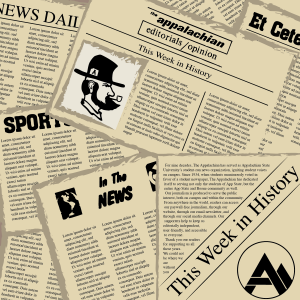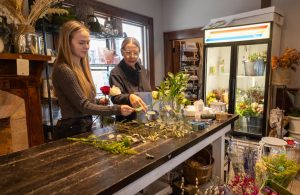Faculty creates accountability group rooted in anti-racism
March 17, 2021
Following in the steps of other universities, a campus group is helping white people work toward being anti-racist.
Called a white accountability group, groups such as this one have existed for decades and are a way for white people to make changes in their behavior to not be unintentionally microaggressive or harmful to people of color.
Two App State faculty members will facilitate the group, Julie Keys and Jeff Cathey, who are each part of white accountability groups with their colleagues and friends.
“It’s not a place to make policy decisions, it’s not a place to make decisions about or for people of color or for the university,” Keys, associate director of counseling services at the Counseling Center, said.
White accountability groups exist in several schools and organizations around the country including The University of North Texas, Loyola University Maryland, The Center for Nonviolent Communication and Reclaim the Sector.
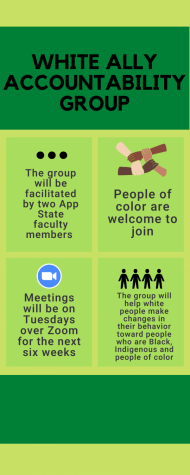
Cathey is the director of the Department of Student Engagement and Leadership. He said it is not people of color’s responsibility to educate white people on being anti-racist or hold them accountable for their actions; white people need to do that work on their own.
He said diverse groups on campus create rich learning environments, but they are typically more enriching for white people.
After the group’s creation, Cathey, Keys and Lamont Sellers, director of intercultural student affairs, met with several Black student leaders who were unclear of the group’s purpose, and provided them with feedback about making the intent of the group more clear on the flyer and expressed a desire to be informed of things like this before they are released to the community.
“We appreciate and will use both pieces of feedback. While we consulted with our colleagues of color ahead of time, we regret that we did not consult with students of color as well and will definitely do this in the future,” Keys said.
App State is a predominantly white institution. Racially and ethnically underrepresented students make up 18% of the student population, and the retention rate for those students is 83.5%, compared to the overall student retention rate of 86.5%, according to App State’s website.
There are around 20 clubs and organizations on campus with a multicultural focus, including the Asian Student Association, the Black Student Association, the Latin Hispanic Alliance, Melanin in Medicine, the Multicultural Greek Council and the National Pan-Hellenic Council.
Cathey said that while diverse groups are very valuable, it is important to take the next step in recognizing that there’s enough information out there that “if we are willing to focus and do the work, we can do this without leaning on others.”
“Once we commit to wanting to go further down this journey of wanting to be better people, better friends and allies, it never ends,” Cathey said. “So it’s important to emphasize that Julie and I don’t feel like we have it figured out. We all grow, and that’ll include the two of us.”
Cathey and Keys originally met some backlash when some students first learned of the group’s name, though the feedback became positive after unpacking the purpose of the group.
Keys said there could be stigma from using “white” in the group’s name because of the United States’ history with groups of white people being racist. But Keys wants to make it clear that this is specifically an anti-racist group, and people of color are welcome to join.
When talking about race, Keys said white people’s intent and impact are often different and can lead to misunderstandings.
“This space is really a way to make sure that people of color don’t have to teach us or educate us, or hear things that could be harmful as we’re trying to work through how to communicate better without being microaggressive,” Keys said. “That harmfulness is so often unintentional, but the impact is still there.”
Microaggressions are everyday behaviors that, whether intentionally or unintentionally, communicate bias against a marginalized group. An example of a racial microaggression would be a white person holding their bag closer to them when a person of color walks by, perpetuating the stereotype that people of color are criminals.
Keys first heard about white accountability groups through Beverly Daniel Tatum, a Black psychologist who supports groups like these that allow for white people to unlearn their bias and stereotypes.
Before creating the group, Keys and Cathey spoke to several people of color, including Sellers and Gayatri Titus, coordinator of multicultural services, both of whom gave their support.
Keys said the meetings will begin with readings and videos by Black and Indigenous authors and creators, followed by discussions working to understand white identity and white privilege, creating goals for doing better the upcoming week and calling in members on ways they can improve unintentional microaggressive tendencies.
White identity is an identity who has enjoyed more privileges within the system than everyone else has for the duration of the United States, and is hard to explain and fathom, Keys said.
“I hope that we as a university can keep having these conversations and discussions around this,” Keys said. “I’m sad by our culture where we vilify people without hearing them out, so I hope this sparks discussion. I would love to be involved in more discussion about it, whether people agree with me or not.”
Meetings will be held Tuesdays over Zoom for the next six weeks, ending April 20.

